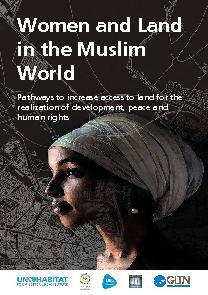Resources
Women & Land in the Muslim World
The challenges in accessing land faced
by women in the Muslim world do not
substantially differ from those faced by
women in other parts of the world. Various
factors, including socially prescribed gender
roles, unequal power dynamics at household
and community level, discriminatory family
practices, unequal access to justice, institutions
and land administration processes, traditional
norms and local tenure relationships serve as a
barrier to women’s tenure rights.
However, 20 per cent of the world’s population is Muslim
and certain land-related patterns reflecting
customary and religious practices emerge as
common elements that create context-specific
opportunities to meet these challenges.
In this report, Global Land Tool Network
partners investigate these common elements,
the international legal frameworks, national
laws and a wide range of country experiences
to promote women’s access to land in the
Muslim world. This report provides practical
and evidence-based guidance on how to
improve women’s access to land in the specific
context of the Muslim world.

